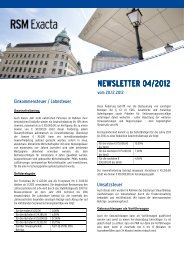Doing Business in India - RSM Austria
Doing Business in India - RSM Austria
Doing Business in India - RSM Austria
Create successful ePaper yourself
Turn your PDF publications into a flip-book with our unique Google optimized e-Paper software.
CHAPTER 3<br />
BUSINESS ENTITIES<br />
1.0 FORMS OF BUSINESS ENTITIES<br />
The pr<strong>in</strong>cipal forms of bus<strong>in</strong>ess organizations <strong>in</strong> <strong>India</strong>, apart from government<br />
organizations and sole proprietary concerns are:<br />
i. Companies - public and private<br />
ii. Branches of foreign companies<br />
iii. Liaison/Branch/Project offices of foreign companies<br />
iv. Partnerships<br />
v. Trusts<br />
vi. Limited Liability Partnerships (LLP)<br />
1.1 Companies<br />
At present, the legislative provisions govern<strong>in</strong>g companies are conta<strong>in</strong>ed <strong>in</strong> the<br />
Companies Act, 1956.<br />
Companies <strong>in</strong> <strong>India</strong> are broadly classified <strong>in</strong>to public sector companies’ viz. with<br />
predom<strong>in</strong>ant government sharehold<strong>in</strong>g and private sector companies’ viz. with<br />
predom<strong>in</strong>ant private sharehold<strong>in</strong>g. Private sector companies may further be<br />
classified as public limited companies or private limited companies. Companies can<br />
also be classified <strong>in</strong>to companies limited by shares, companies limited by guarantee<br />
and unlimited liability companies. However, for bus<strong>in</strong>ess purposes, generally<br />
companies limited by shares are used and consequently, the discussion regard<strong>in</strong>g<br />
companies <strong>in</strong> this guide is perta<strong>in</strong><strong>in</strong>g to such companies. The shares of public<br />
companies may or may not be listed on stock exchanges <strong>in</strong> <strong>India</strong>. (e.g. The National<br />
Stock Exchange of <strong>India</strong> Ltd (NSE), Bombay Stock Exchange Ltd (BSE), etc.) The<br />
regulatory provisions for private limited companies are less str<strong>in</strong>gent than those<br />
relat<strong>in</strong>g to public limited companies. Public limited companies whose shares are<br />
listed on stock exchanges are subject to the regulations of the Securities and<br />
Exchange Board of <strong>India</strong> (SEBI) and the respective stock exchanges.<br />
Private companies that are subsidiaries of public companies (i.e. where<br />
sharehold<strong>in</strong>g of Public companies is more than 50%) are however treated at par<br />
with public companies.<br />
Shares of public limited companies are freely transferable, whereas it is subject to<br />
restrictions <strong>in</strong> case of private limited companies. However, transfer of shares to nonresidents<br />
is regulated by Foreign Exchange Management Act, 1999.<br />
The system of depository has been <strong>in</strong>troduced by the Depositories Act and<br />
Securities Exchange Board of <strong>India</strong> (Depository & Participants) Regulations, 1996<br />
which has smoothened the transfer of shares <strong>in</strong> case of listed companies.<br />
22<br />
DOING BUSINESS IN INDIA














